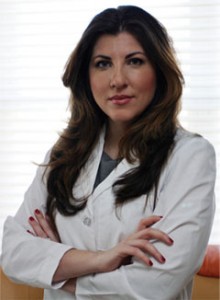Menstrual Problems (Long Periods, Heavy Periods, Irregular Periods, Painful Periods, etc.)
Posted by admin on July 6th, 2013

“Menstrual problems are very common. While some women sail through their periods without ever experiencing any issues, other women experience heavy, prolonged, irregular or painful periods that can impact their life greatly. Menstrual problems can be caused by a wide variety of issues, from structural to functional to hormonal problems. If your periods are ruling your life, causing you to dread their appearance, it’s time you did something about them. Most menstrual problems can be treated effectively”.
-Dr. Bella Zimilevich, MD
Skipping periods (irregular or absent periods)
Many women will occasionally miss their period for good reason. This may occur if you are pregnant, breastfeeding or have reached menopause. Young women often have irregular periods in the first year or two after first starting their period. If none of these apply to you, the cause may be:
- problems with the pituitary, thalamus or the thyroid gland-these glands secrete hormones which influence the menstrual cycle
- prolonged strenuous exercise
- very low body weight- excess exercise and low body weight (gymnasts are a prime example) may result in absent or irregular periods
- anatomical problems of the cervix, vagina or uterus
- chronic illness- if you have been unwell, you may stop ovulating
- hormonal imbalances
- stress- severe and prolonged stress may actually cause your periods to stop for awhile
- premature menopause- occasionally, women will go into menopause earlier than expected
- ovarian problems- large cysts on ovaries and other problems may influence hormone levels
- certain medications- chemotherapy, antipsychotic drugs and hormones may affect your periods
Absent periods (known as amenorrhea) means that your periods are totally absent. In primary amenorrhea, a young woman reaches the age of 16 without starting her period. In secondary amenorrhea, a woman who has previously had a period misses her period for six months or longer. The cause of amenorrhea may be any of the problems listed above.
Painful Periods (Dysmenorrhea)
Painful periods are common menstrual problems. Many women experience cramps and lower back discomfort in the first day or two of their period, but for some the pain can be severe enough that normal activities become difficult. Abdominal cramping and back pain may be accompanied by nausea, headache and sometimes vomiting.
Primary dysmenorrhea is caused by contractions of the uterus. It is estimated that almost half of all menstruating women have primary dysmenorrhea. Symptoms are often at their worst in the first day or two of their period.
Secondary dysmenorrhea is caused by an underlying problem such as:
- IUDs (intrauterine devices)
- uterine abnormalities such as fibroids (abnormal growths in the uterus)
- endometriosis (a condition in which uterine tissue is present outside the uterus)
- PID (pelvic inflammatory disease) caused by infection of the uterus, fallopian tubes and/or ovaries)
Heavy or Prolonged Periods (Menorrhagia)
When periods are abnormally long (lasting more than a week) or very heavy, with large clots and episodes of flooding, anemia can occur. There are many problems that can cause menorrhagia, such as:
- uterine fibroids or polyps
- a bleeding tendency or disorder
- cancer (rarely)
- infection
- thyroid disease
- kidney or liver disease
- hormonal imbalances
- certain medications (aspirin, anticoagulants)
- IUDs
What can I expect when I come to the clinic with menstrual problems?
If you come to see me complaining of irregular, prolonged, heavy and/or painful periods, I will first ask about your past gynecological history, including the age you first began menstruating, length and duration of normal menstrual cycles, when the problem started and whether you have been pregnant and/or given birth before. I’ll ask about medications you are taking. I will also perform a physical exam, which may include a vaginal exam and pap smear if necessary. I may order blood work or other diagnostic tests, depending on what I think the problem may be.
What treatment is available for menstrual problems?
The treatment I prescribe will be dependent upon what is causing your menstrual problem. Because there are so many possibilities, I can’t list them all here. Suffice it to say that most menstrual problems can be treated.
If you are experiencing heavy, painful, irregular or prolonged periods, make an appointment to come and see me. Your period should not make you feel miserable. Treatment is available, but in order to help you with your menstrual problems I first need to see you, so make your appointment today.
Our Location

6301 Mill Lane, Brooklyn, NY 11234.
(718) 942-4600



